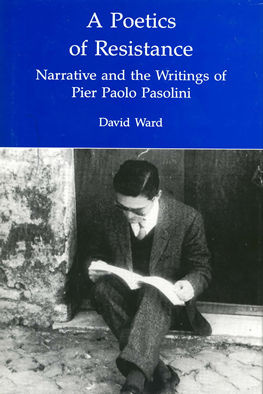


A Poetics of Resistance
Narrative and the
Writings of Pier Paolo Pasolini
by David Ward



A Poetics of Resistance
Narrative and the
Writings of Pier Paolo Pasolini
by David Ward

"A Poetics of Resistance: Narrative and the Writings of Pier Paolo Pasolini examines the writings of the Italian poet, novelist, filmmaker, theorist, and dramaturg.
Since his murder in 1975 - and especially in the last eight years - Pasolini has been the object of growing critical attention, especially in the United States. For the most part, this new attention has been directed at Pasolini's cinema, the part of his multifarious cultural activity for which he is best known outside Italy. Pasolini, however, was extremely active in different areas of Italian cultural life. Before dedicating himself to cinema, he had made his name as a poet, novelist and theorist of language and literature, and in the course of his career also achieved fame as a film theorist, dramaturg, and journalist. This book aims to redress the imbalance by directing critical attention to these relatively neglected areas of Pasolini studies. In particular, the book focuses on the question of narrative form that invests all of Pasolini's writings.
Starting from Pasolini's first encounter with the question of narrative form that in his early Friulan novels, author David Ward then follows the series of experiments that characterize Pasolini's writings through the Roman novels, his language, literature and film theory, journalism, and theater writings up to Petrolio (Oil), his unfinished and posthumously published novel. The book argues that the central concern of Pasolini's writings is the attempt to develop a narrative form that responds to two specific demands: on the one hand, a "possessive," epistemologically rigorous narrative form that enables us to analyze and know the world; and on the other, an open-ended nonpossessive narrative form sensitive to the fragility, integrity, and poeticity of the phenomena of the world and which resists the heavy-handedness of conventional narrative form.
The book offers readers in-depth analyses of all Pasolini's novels, including for the first time in English a detailed analyses of Petrolio, which has received no critical attention outside Italy. The part of Pasolini's writing that has received the most critical attention has been his film theory. As well as offering a panorama of Italian, British, French, and American readings of these difficult essays, ward argues that it is necessary to reconsider the role ascribed to what Pasolini calls "film," the process by which a narrative account of reality is put together.
Ward also offers detailed analyses of Pasolini's six verse tragedies. The book concludes with the suggestion that Pasolini's best attempt at combining the conflict demands that the notions of "film" and "cinema" produced in his film writings comes with his "Manifesto for a New Theater," which has previously been neglected by scholars."
| Home | Bio Info | Books | Courses at Wellesley | Resume | Wintersession | Italian Studies Dept |
|---|